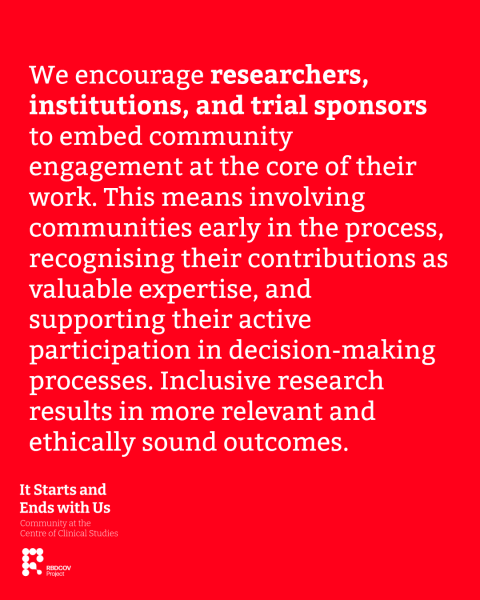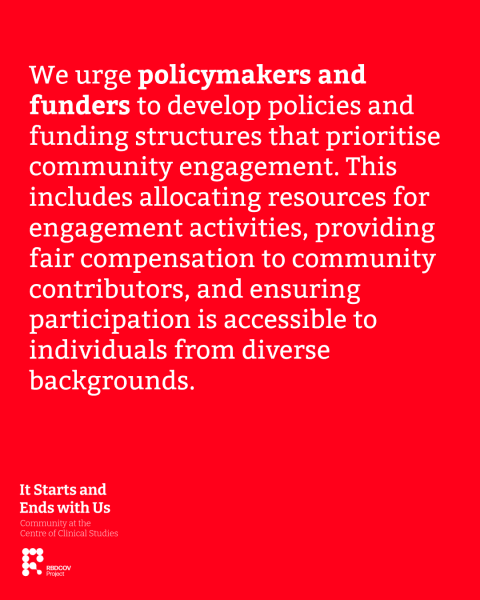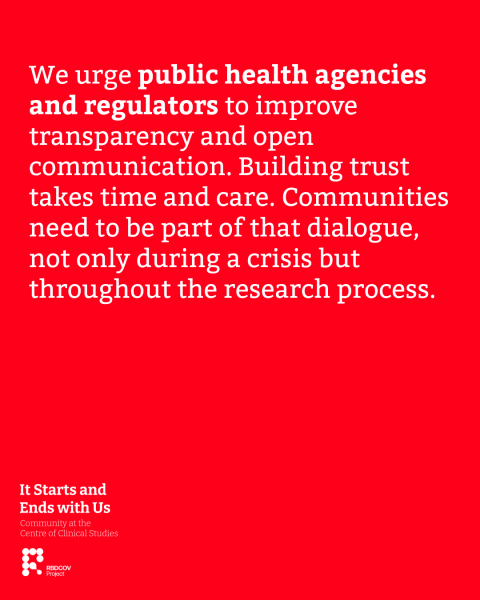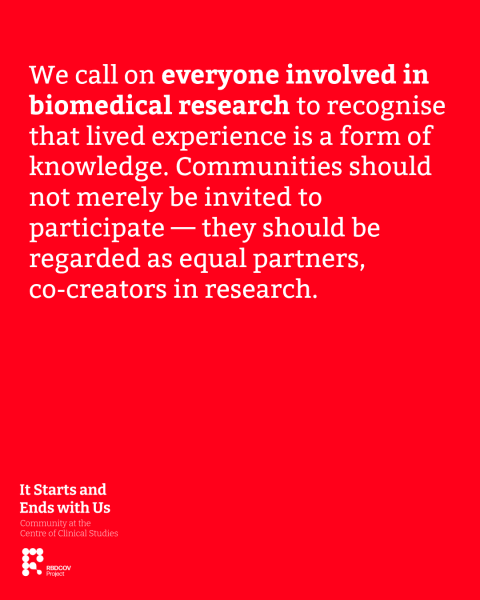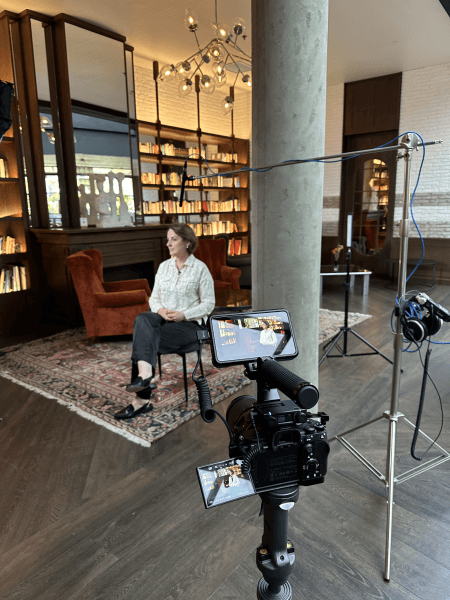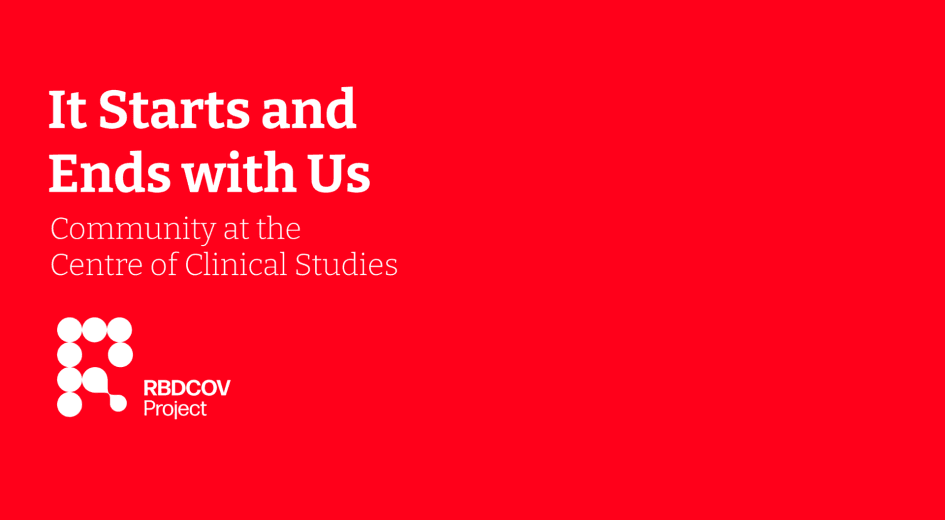
We call for meaningful community engagement at every step of clinical research. To recognise lived experience as expertise, to support inclusive practices in research, to value people as partners in innovation.
#StartsWithUsEndsWithUs
We call on researchers, policymakers, sponsors and public health leaders to champion meaningful community engagement at every step of clinical research. This includes recognising lived experience as expertise, supporting inclusive practices in research, and valuing people as partners in innovation.
About the Campaign
This campaign by the European AIDS Treatment Group (EATG) sheds light on the essential role that communities play in shaping stronger, more ethical and effective health research. It focuses on the experiences of the Community Advisory Panel (CAP) within the RBDCOV project, an initiative supported by EU Horizon 2020 to develop a new COVID-19 vaccine.
Too often, research is designed without input from the very people it affects. This campaign challenges that approach by sharing the voices and insights of community members who were involved from the start of the study design. Through personal interviews, written reflections, and open conversations, we highlight how community knowledge can improve both the quality and the impact of scientific research.
This is a campaign about shifting mindsets. Research is not something done to communities. It must be done with them. Because real progress in public health starts and ends with the people it serves.

Community Voices in Research
People who live with and are affected by health conditions bring vital experience and insight to the table. Their knowledge helps make clinical trials more accessible, more trusted, and more effective. In the RBDCOV project, this principle guided the work of the Community Advisory Panel.
CAP members played an active role in shaping the study. They helped review clinical trial protocols, suggested improvements to participant materials, ensured the use of clear and inclusive language, and contributed to outreach strategies. Their input helped make the study more relevant to real people and more ethical in its approach. The CAP also supported the psychosocial research component, which explored the emotional and social experiences of participants.
To share these perspectives, we produced six video interviews with CAP members and two blog articles. Together, these eight stories offer a wide-ranging view of what it means to be part of an inclusive research project.
The topics we touch upon in this campaign include youth participation in vaccine trials, the importance of representation in study design, trust and vaccine hesitancy, and the history of patient activism in public health.
All interviews are available on EATG’s YouTube channel and are subtitled in English, Spanish, and Catalan.


Co-creating a community campaign
At the heart of this campaign are the real voices of community advocates who are helping reshape the future of clinical research.
EATG is leading WP9 of the RBDCOV project, which focuses on Community Engagement. In this context, establishing a Community Advisory Panel (CAP) was a key priority from the outset of the project. The CAP, consisted of EATG members and expert representatives from other disease area communities, drove various elements of the projects, and the outcomes of their work are summarised at the RBDCOV Community Engagement Toolbox.
This campaign provides the space to showcase these achievements and the importance of meaningfully engaging the community in clinical research from start to end.
EATG’s communication team focused on creating a setting of co-creation, where CAP members led the aims, focus, direction, and key messaging of the campaign. Starting from a cooperative concept note that was discussed over online meetings, we agreed that the final face-to-face CAP meeting would be the right place to shoot the storytelling videos. During this meeting in Barcelona, we filmed six powerful interviews who. Each story offers a unique window into what meaningful community involvement looks like in practice, from influencing trial design to breaking down barriers in vaccine access.
To ensure every voice was included, two CAP members who couldn’t attend in person shared their insights through written blogs. Their reflections dive deep into issues like youth participation in clinical trials and how we can make research more inclusive and representative.
A podcast about this campaign
EATG’s communication team spoke about this campaign on an episode of RBDCOV Talks, the project’s official podcast.
I hope people see that community engagement is not a “nice to have” — it’s essential. And it must be diverse — gender-diverse, culturally diverse, generationally diverse. We can’t keep designing trials that exclude the very people we claim to serve. If this campaign helps other research projects think differently — if it gets one policymaker or one researcher to say, “Let’s invite the community in now, not later” — then we’ve succeeded. Because ultimately, inclusion leads to better research. And better research leads to better health.
Apostolos Kalogiannis, Communications Manager
During the video shoot in Barcelona, we gave each community panel member space to speak on camera about what inclusion meant to them. One of them said, “This is the first time I’ve been asked what I think — not just handed a brochure.” That really moved me. It reminded me that engagement is about dignity. About showing people that they don’t have to earn a seat at the table — they already deserve to be there. And when they are, the whole table is stronger.
Tania Sanchis, RBDCOV Community Engagement Communications Officer
It Starts and Ends with Community
These interviews and blogs are not just updates; they are stories that move, inform, and inspire. We invite you to explore them, listen closely, and hear directly from the people who are pushing for more ethical and inclusive science.
All videos are available on EATG’s YouTube channel with subtitles in English, Spanish, and Catalan. Whether you are a researcher, policymaker, healthcare worker, or community member, these stories are for you.
We hope you will join us, share these stories, and carry their messages forward.

About the RBDCOV project
RBDCOV is a clinical research project supported by the Horizon 2020 programme of the European Union. Its goal is to test a recombinant protein vaccine against COVID-19. The study focuses on two key groups often excluded from clinical trials: children and adolescents, and people with weakened immune systems. Including these populations is essential for achieving more equitable vaccine access and protection.
The project brings together organisations and institutions from five European countries, combining scientific research with community insight. RBDCOV is led by HIPRA, a biotechnological pharmaceutical company based in Spain.
Partners include:
- In Spain: Vall d’Hebron Institut de Recerca, IrsiCaixa, Fundación Lucha contra el SIDA (FLS), IDIBAPS, IDIBGI, ASPHALION, Vinces Consulting, Zabala Innovation
- In the United Kingdom: Veristat International
- In Italy: Fondazione Penta
- In Germany and Belgium: European AIDS Treatment Group (EATG)
- In Turkey: Metpharm Arastirma Gelistirme Saglik Danismanlik
EATG coordinated WP9 (Community Engagement) and set up the Community Advisory Panel for RBDCOV. This ensured that community voices were integrated into study design, communication strategies, and the psychosocial aspects of the project. The result is a research process that reflects both scientific goals and the real-world needs of participants.
Members of the RBDCOV Community Advisory Panel: Juan Francisco Cabrera Solano, Jennifer Catherine Camaradou, Paul Clift, Marine (Maka) Gogia, Bogdan Hadarag, Apostolos Kalogiannis, Arda Karapınar, Mercy Nangwale, Daniela Rojas Castro, Maryan Said, Siegfried Schwarze, Mona Sundnes, Joan Tallada, Deniz Uyanik, Alain Volny-Anne, Brian Charles West
RBDCOV shows what can happen when science and community work together. This campaign is here to tell that story and help build a better path forward.
Credits
Apostolos Kalogiannis, EATG Communication Manager – Campaign Manager
Tania Sanchis, EATG Communication Officer – Campaign Implementor
Guillermo Sánchez Luján – Videographer
Jennifer Catherine Camaradou, Marine (Maka) Gogia, Arda Karapınar, Joan Tallada, Alain Volny-Anne, Brian Charles West, Beatriz Mothe, Giorgio Barbareschi, Shatyam Issur – Campaign Interviews and Blogs
Community Advisory Panel: Juan Francisco Cabrera Solano, Jennifer Catherine Camaradou, Paul Clift, Marine (Maka) Gogia, Bogdan Hadarag, Apostolos Kalogiannis, Arda Karapınar, Mercy Nangwale, Daniela Rojas Castro, Maryan Said, Siegfried Schwarze, Mona Sundnes, Joan Tallada, Deniz Uyanik, Alain Volny-Anne, Brian Charles West – Campaign Content Developers
[Last update: 27 August 2025]
The RBDCOV project has received funding from the European Union’s Horizon 2020 research and innovation programme under grant agreement No 101046118
Views and opinions expressed are those of the author(s) only and do not necessarily reflect those of the European Union. Neither the European Union nor the granting authority can be held responsible for them.
Get involved
Are you living with HIV/AIDS? Are you part of a community affected by HIV/AIDS and co-infections? Do you work or volunteer in the field? Are you motivated by our cause and interested to support our work?
Subscribe
Stay in the loop and get all the important EATG updates in your inbox with the EATG newsletter. The HIV & co-infections bulletin is your source of handpicked news from the field arriving regularly to your inbox.

